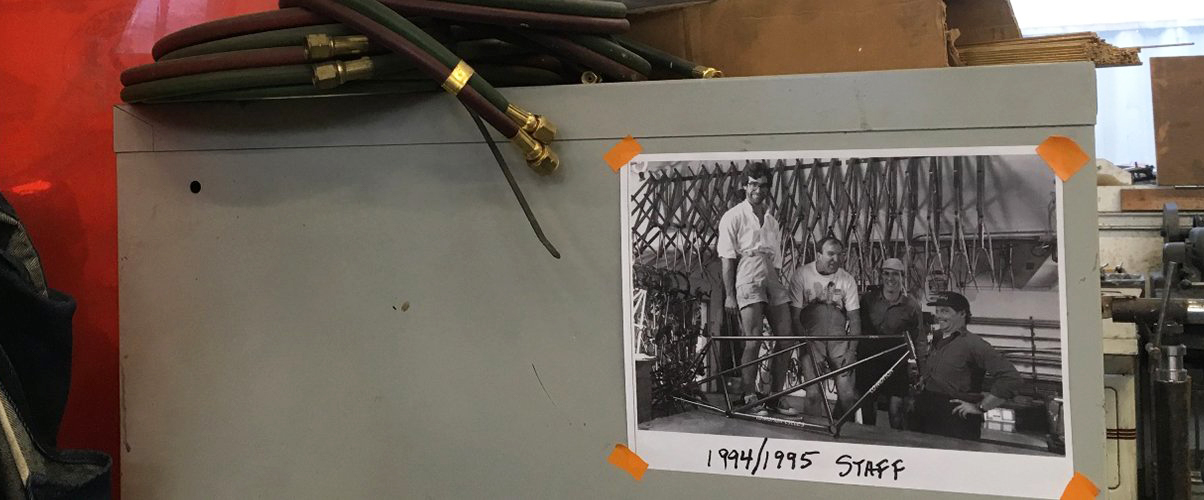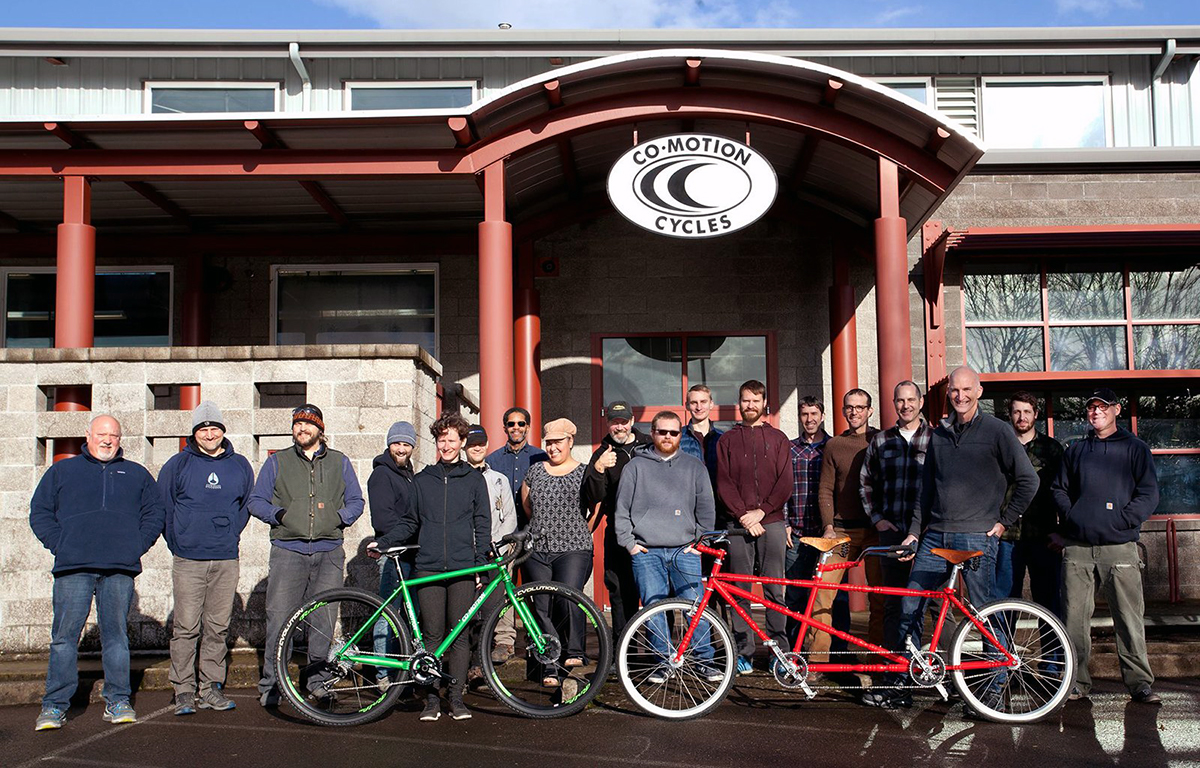American Made, Oregon Made, Handmade
This article first appeared in the July 2021 issue of Adventure Cyclist magazine. Co-Motion Cycles is an Adventure Cycling Corporate Member.
Any conversation about the most well-respected bike brands on the market today is sure to have Co-Motion Cycles at the top of the list, and after sitting down with Co-Motion founder Dwan Shepard, it’s easy to see why.
Founded in 1988, Co-Motion Cycles takes pride in its bikes being “American Made, Oregon Made, and Handmade.” For 33 years, the company has garnered a world-renowned reputation for outstanding quality and continues to be a leader in innovation — a testament to the dedication of Shepard and his staff of 18 employees based out of their headquarters in Eugene, Oregon. According to Shepard, “If you’re looking for something American made, you can’t get any more American made than a Co-Motion bicycle.”
Shepard’s journey with bikes began around the same time as the early days of Bikecentennial, the event that served as the origin of today’s Adventure Cycling Association, so it’s no coincidence that Co-Motion has been a name synonymous with bicycle touring since its inception.
“I grew up in Coos Bay on the Oregon coast, and although that town was not on the Bikecentennial route, a lot of people were riding it and then heading south down the West Coast. I was 14 years old in 1976, but I was just starting to hang out at bike shops,” said Shepard. “I sort of had the ‘annoying shop kid’ title at a little bike shop called Stereo 101 and Bicycle Repair, where they worked on sound systems and bicycles. I met some touring cyclists there and got inspired. It looked like something I wanted to do.”
Before long, Shepard was working in bike shops, eventually crossing paths with master framebuilder Gary Hale in Eugene, Oregon, who, along with Ross Shafer of Salsa Cycles fame, was well known for building bikes back in the late ’70s.
“I worked for Gary for five years while I kept my other part-time job at a bicycle shop, and at the end of that time, Gary was getting more into other kinds of metal fabrication.” It was around that time that Gary offered to sell the shop to Shepard. He partnered with friend Butch Boucher, who later went on to work for Moots Cycles, and Dan Vrijmoet, who remained a partner until his retirement in 2018. With a few thousand dollars between them, the three cycling pals suddenly found themselves in possession of a funky old lathe, some welding tanks and torches, and the beginnings of what would eventually become Co-Motion Cycles.

For the first few years, frame repairs for individuals and shops around the northwest was their bread and butter that kept the shop afloat. They built single and tandem frames for themselves and their friends, and began to build a local reputation.
“We decided early on to give tandems a go because everybody else was building mountain bikes and there wasn’t much interest in road bikes at all,” explained Shepard. As it turned out, Co-Motion’s experience and knowledge of building high-quality tandem bikes seamlessly transferred over to their other models, including their touring offerings.
“It was really hard for people to find a bike that had the gearing that they needed, had strong enough wheels to support a touring load, was able to carry water bottles, and had eyelets for fenders and racks, let alone decent geometry that was balanced and safe,” said Shepard.
“We thought, well you know, it’s not that hard to build a bike that can support a load, we do that with tandems every day. So we started building a few single bikes that were essentially built with tandem tubing and a tandem wheelset.”
As is often the case with touring bikes, necessity is the mother of invention, or in Co-Motion’s case, innovation. Shepard explained, “We’re situated really well to jump in on new technology because we’re small and we’re able to figure out innovative ways to integrate those things into our bike frames.
“We’ve grabbed on to a lot of niche ideas that have really driven a lot of business for us, like the S&S coupler. We were the first company to incorporate those into stock bicycles. We were an early adopter of the Rohloff hub and Pinion gearboxes, and the first non-European company to offer them as options on a bunch of different bikes.”

Past the tubing, it’s the special features that make Co-Motion bikes a hit with bicycle tourists. Kickstand mounts, Steerstoppers for stabilization, and dynamo hubs are available on a number of Co-Motion models. They also offer quality, handmade complete bikes, such as the Deschutes, ready to tackle any road at a price that lowers the barrier to bicycle touring.
Shepard proudly recalled a Race Across America victory atop one of his tandems; multiple gold, silver, and bronze Paralympic Games tandem medals earned by the American and international teams; and a photo sent in by a glaciologist riding a Co-Motion in Antarctica. Through these recollections, his humble personality and calm demeanor reflect his company’s genuine regard for the bikes they create and the people who ride them. It is this mutual respect that leaves no question why Co-Motion has remained one of the most highly revered bicycle brands, from Eugene, Oregon, to the far reaches of the globe.
Visit Co-Motion’s website to see their array of tandem and individual bikes available for custom order.

